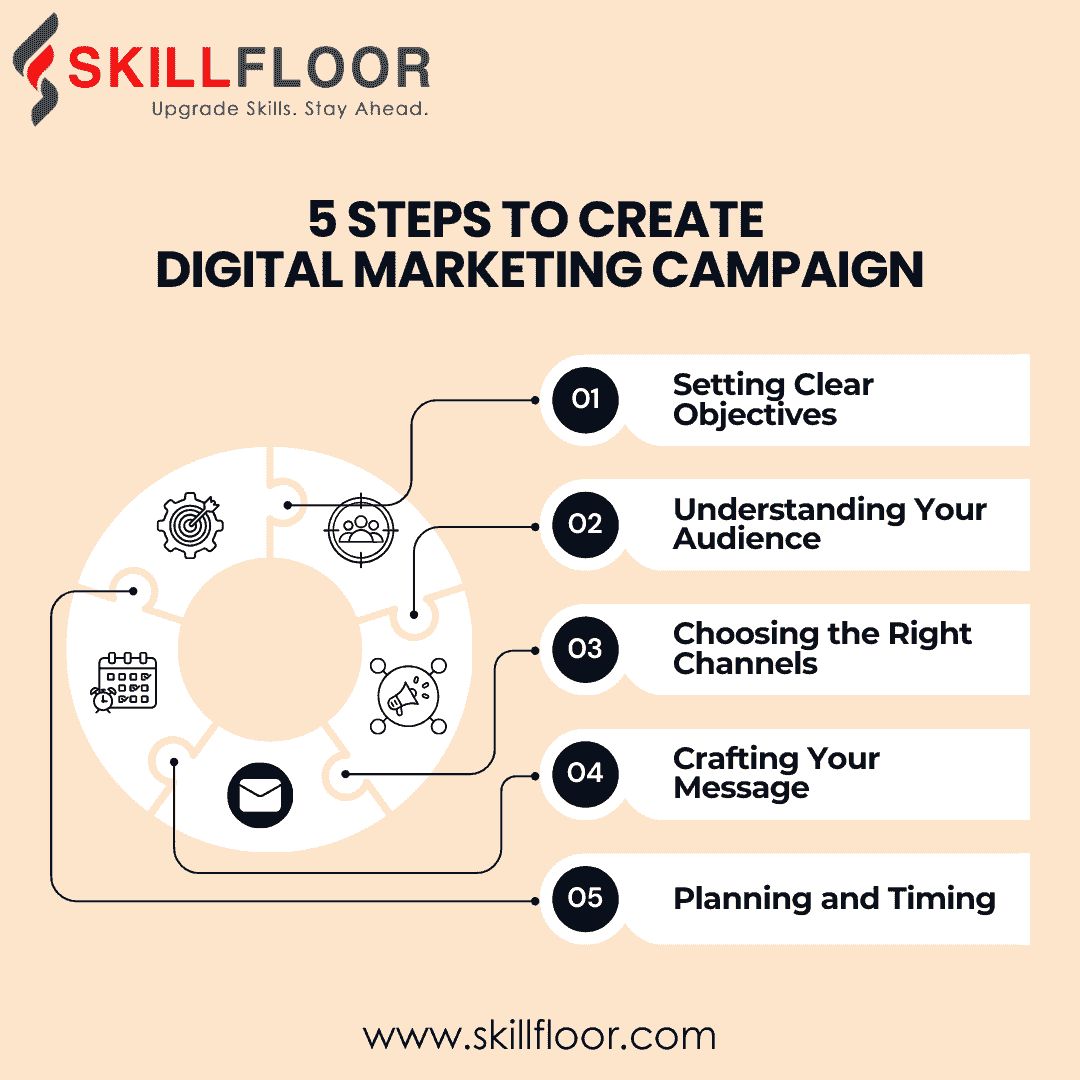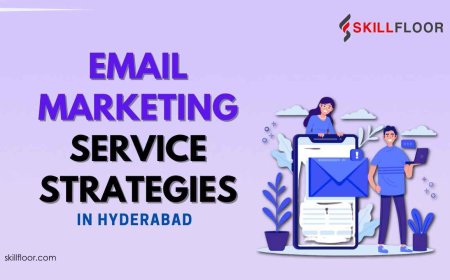What is a Digital Marketing Campaign?
Learn what a digital marketing campaign is, including its key components, strategies, and how it can drive traffic, leads, and sales for your business.

Have you noticed how many of our everyday activities, including buying and socializing, are now done online? Businesses have also moved their attempts to contact clients online as individuals spend more time on the internet. Due to this shift, digital marketing is now essential for expansion. However, what is digital marketing, and what goes into a campaign for it? To flourish in the Internet economy, one must comprehend these ideas.
The Need for Digital Marketing
Businesses must evolve to remain competitive. Nowadays, a crucial tactic for connecting with consumers where they are most engaged is digital marketing. A well-designed digital marketing campaign helps companies, amidst the cacophony of the digital marketplace, to successfully engage with their audience and accomplish their goals.
Your efforts might be overlooked by innumerable rivals if you don't have a digital marketing campaign. Using online methods is essential if you want to make an impression and establish a connection with potential clients. Putting money into digital marketing increases your chances of success by ensuring that the correct people hear your message at the right moment.
Benefits of Digital Marketing for Every Business
-
Wider Reach: Businesses may reach potential clients well beyond their local region by connecting with a global audience through digital marketing. This is a reasonably priced method of increasing market share.
-
Targeted Advertising: Specific demographics, interests, and behaviors may be effectively targeted using digital marketing. This guarantees that the individuals most likely to be interested in your goods or services hear about your message.
-
Cost-Effective: Digital marketing frequently needs a smaller budget than traditional marketing techniques. It is affordable and accessible to companies of all kinds, allowing you to attain noteworthy outcomes without breaking the bank.
-
Measurable Results: You can monitor performance and gauge success thanks to the comprehensive data offered by digital marketing. Simple observation of what is effective allows you to modify tactics for improved outcomes.
-
Enhanced Engagement: You may communicate directly with your audience via email, social media, and other internet channels. This interaction strengthens bonds between people and promotes brand loyalty.
What Is a Digital Marketing Campaign?
A digital marketing campaign consists of various online advertising strategies aimed at boosting the visibility of your company, both online and offline. These strategies can be either paid or unpaid. Paid tactics require an investment, while unpaid tactics are often referred to as "organic."
Successful digital marketing campaigns require careful planning and execution. You’ll need to define your objectives, choose the right channels, and create engaging content. Monitoring and adjusting your campaign based on performance ensures you get the best results and connect effectively with your audience.
Advantages of Running a Digital Marketing Campaign
There are several advantages when running a digital marketing campaign. Here are several ways it may greatly improve your marketing initiatives, from increasing your brand's internet visibility to offering insightful data:
-
Higher Conversion Rates: By reaching the appropriate demographic, targeted digital marketing activities raise the likelihood that leads will become clients. Improved marketing outcomes are the outcome of this.
-
Flexibility and Adaptability: Digital marketing campaigns may be instantly modified based on performance, unlike traditional marketing. This adaptability enables you to adjust your strategy and remain sensitive to changes in the market.
-
Improved Customer Insights: Digital marketing strategies offer profound insights into the behavior and preferences of their target audience through analytics and tracking. This data aids in customizing your tactics to increase participation.
-
Enhanced Brand Credibility: Using consistently excellent content in your digital marketing strategy helps to establish your company as an authority and fosters trust. Increased client loyalty and confidence may result from this credibility.
-
Effective Use of Multichannel Strategies: An effective plan that optimizes your reach and impact is achieved by the integration of many online channels, including social media, email, and search engines, in a digital marketing campaign.
Types of Digital Marketing Campaign
-
Social Media Campaigns: Use social media sites like Facebook and Instagram to market your brand. To build a relationship with your audience and increase interaction, use adverts and interesting content.
-
Email Marketing Campaigns: Send subscribers customized emails. By providing individualized and pertinent material, this aids with lead nurturing, product announcements, and relationship maintenance.
-
Search Engine Marketing (SEM) Campaigns: To improve visibility, make use of search engine sponsored advertisements. To increase traffic, SEM targets those who are actively looking for your goods or services.
-
Pay-Per-Click (PPC) Campaigns: Run ads that charge per click. PPC campaigns drive targeted traffic to your website quickly and efficiently, helping boost conversions.
-
Influencer Marketing Campaigns: Collaborate with influential people to market your business. To broaden your audience and raise awareness of your business, these ads make use of their credibility and audience.
-
Affiliate Marketing Campaigns: Work together with affiliates that send traffic to your items in return for commissions. By leveraging affiliates' networks to drive purchases, broadens your audience.
5 Steps to Create a Digital Marketing Campaign
1. Setting Clear Objectives
You must be clear about your goals before launching any campaign. This is what you want to accomplish. Your campaign is more likely to become distracted and fall flat on its face if it has a defined goal.
Some common objectives include:
-
Increasing Brand Awareness: Promote your company online to increase exposure and reach. More people will know and remember your brand if it has a strong online presence.
-
Driving Traffic to Your Website: Employ online marketing techniques to get people to your website. Increased traffic can increase the likelihood of receiving inquiries and closing deals.
-
Generating Leads: Get the contact information of potential clients who could be interested in your products. A prospect list is developed through efficient lead generation in preparation for potential interaction and conversion.
-
Boosting Sales: Put tactics into place that will motivate your audience to buy. You may enhance your business's revenue and boost sales with targeted marketing campaigns.
2. Understanding Your Audience
The secret to a successful digital marketing strategy is knowing your audience. Begin by compiling information on the demographics, interests, and habits of your clients. Your marketing efforts will be more successful if you can use this information to better customize your content to their requirements and tastes.
Next, develop thorough buyer personas to symbolize various consumer groupings. These personas must contain details like hobbies, employment, and age. You may create messaging that is more pertinent and interesting by attending to the particular demands of these groups.
Finally, keep improving your comprehension of your audience by using analytics and feedback. Observe how people engage with your material and modify your tactics in response to what gets through the strongest. Your digital marketing campaign will always be in line with their changing demands thanks to this continuous procedure.

3. Choosing the Right Channels
Selecting the appropriate channels is crucial to the success of your campaign as there are several methods to reach your audience on the internet. Digital marketing channels that are often used include as following:
-
Social media: Reaching your audience where they spend their time is possible with platforms like Facebook, Instagram, and LinkedIn. Select the platform based on its alignment with your target audience and goals.
-
Search Engines: SEO and SEM make your company more visible in search results. While SEO focuses on improving your site for organic results, SEM employs paid advertisements.
-
Email: Email marketing targets consumers with relevant communications. It's a useful strategy for keeping customers informed and interested in your company.
-
Content Marketing: Provide informative content, like blogs and videos, to draw in and keep viewers interested. It increases confidence and establishes your company as a pioneer in the field.
4. Crafting Your Message
An effective digital marketing campaign requires carefully crafting your message. Determine the main point you wish to make and make sure it reflects the objectives and values of your brand. Your message needs to be concise, engaging, and specifically designed to speak to your intended audience.
Make content that draws readers in and motivates them to take action next. Make sure the words you choose appeal to the needs and wants of your audience. To stand out in a crowded digital world, emphasize the features that set your product or service apart.
Finally, keep everything uniform across all platforms. Your message should be consistent whether you're updating your website, sending an email, or publishing on social media. Throughout your digital marketing strategy, consistency helps to maintain your brand identity and guarantees that your audience has a consistent experience.
5. Planning and Timing
An effective digital marketing campaign requires careful preparation and timing. Here are some tips to make sure your campaign is successful and meets your objectives:
-
Set Clear Milestones: Set clear objectives and due dates for every stage of your campaign. Having distinct benchmarks makes it easier to monitor development and adhere to timetables.
-
Create a Content Calendar: Prepare the content ahead of time to guarantee a unified message. Using a content calendar makes it easier to keep on top of things and schedule posts on time.
-
Optimize Posting Times: Find out when your target market is most likely to be online. Posting at these busy times will increase exposure and interaction.
-
Adjust as Needed: Regularly check on the effectiveness of your campaign. To enhance outcomes and resolve any difficulties, be prepared to make changes in response to real-time input.
How to Know If Your Campaign Is Working
-
Track Key Metrics: Keep an eye on key performance indicators such as engagement levels, conversion rates, and click-through rates. The performance of your campaign and if it is accomplishing your objectives are shown by these indicators.
-
Analyze Traffic Sources: Make use of tools to determine the source of your traffic. Finding the most efficient routes and determining if they are bringing in high-quality visitors is made easier with this.
-
Monitor ROI: Comparing the income received to the campaign's cost will allow you to determine the return on investment. If your campaign has a positive return on investment, it is profitable.
-
Gather Customer Feedback: Utilize social media or surveys to get audience input. Gaining insight into their responses and experiences might help you assess how successful your campaign was.
Tools to Calculate Digital Marketing Campaign Performance
|
Tool |
Purpose |
Features |
Best For |
|
Website traffic and user behavior |
Tracks site visits, bounce rates, and conversions; integrates with other tools. |
Website performance tracking |
|
|
SEMrush |
SEO and SEM performance |
Provides keyword research, site audits, and competitor analysis. |
SEO and paid advertising |
|
HubSpot |
Inbound marketing and CRM |
Offers email tracking, lead management, and campaign analytics. |
Comprehensive campaign management |
|
Mailchimp |
Email marketing performance |
Analyzes email open rates, click-through rates, and subscriber engagement. |
Email marketing campaigns |
|
Hootsuite |
Social media management |
Tracks social media performance, engagement metrics, and audience growth. |
Social media campaigns |
The exposure and engagement of your organization may be significantly increased with a well-run digital marketing campaign. Impactful campaigns that produce results are made possible by knowing your target, selecting the appropriate media, and developing a strong message. To keep your digital marketing campaign productive and in line with company objectives, track performance and make necessary strategy adjustments based on immediate feedback. To increase your online visibility and establish a deeper connection with your audience, adopt these tactics and technologies. Sustaining flexibility and continuously refining your strategy to satisfy the ever-evolving demands of the digital landscape is essential for success in the content marketing industry.





























































